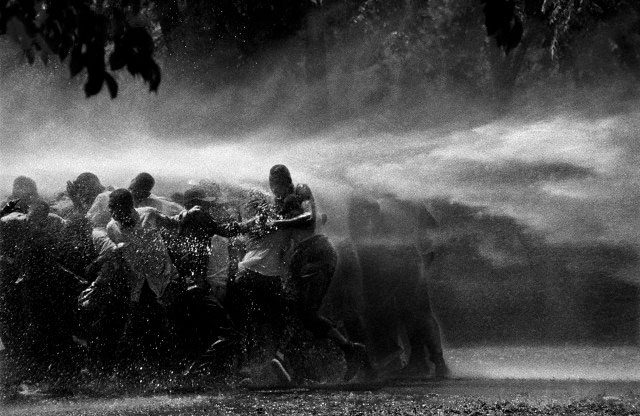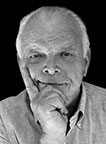Gloria Washington – "The Coming Showdown in the Race Crisis"
"Negroes join hands to keep from being knocked down by water from the fire hoses used in Birmingham." Kelly Ingram Park, Birmingham, Alabama. May, 1963. Photo by Bob Adelman, from the July 16, 1963, edition of LOOK. Adelman later wrote, "I have never witnessed such cruelty. There was almost as much moisture behind the lens as in front. I gave a print of this picture to Dr. [Martin Luther] King. He studied it and said, 'I am startled that out of so much pain some beauty came.' " |

|
|
Gloria Washington at one of the sculpture memorials now at Kelly Ingram Park, Birmingham AL. Photo by Bill Ganzel, March 2016. |
|
|
Gloria Washington grew up during the 50s in a segregated neighborhood of Birmingham Alabama, one of the most segregated cities in America. She describes it as a sheltered childhood because she rarely ventured out of the neighborhood, but "I knew something was different when [my mother] would take me to town [on the bus]. There would be a thousand seats but you had to go all the way to the back." In 1955, the Montgomery Alabama bus boycott by blacks ignited the modern civil rights protest movement, and Gloria experienced more overt racism. "They started the bombings. People cursing you and calling you nasty names." Local and state laws allowed Negroes to buy goods at some stores, but they couldn't eat at the lunch counters. There were separate, and inferior, water fountains and restrooms. Negroes had to sit in the balcony at the few movie theaters that admitted them. Most of the jobs available to blacks outside of the segregated neighborhoods were menial labor in the mines and steel mills. In 1963, local pastor Rev. Fred Shuttlesworth organized a series of sit-ins and marches intended to provoke mass arrests. The goal was to fill the jails to pressure business leaders to open employment to people of all races and end segregation in public facilities, restaurants, schools, and stores. The white political leaders refused, and Shuttlesworth asked Dr. Martin Luther King, Jr., and the Southern Christian Leadership Council, to get involved. The problem was that there were a limited number of black adults in Birmingham who could afford to go to jail – and probably lose their jobs – for the cause. So, Rev. James Bevel suggested that the movement involve children as non-violent demonstrators. That set off a lot of debate, with Malcolm X and Attorney General Robert F. Kennedy opposed to using children. But Bevel recruited black girls from the segregated high schools and, as he suspected, the young black men followed. Gloria was 15 when she started attending mass meetings where Bevel and others taught her how to react non-violently when violence was inflicted on her. On the first day of the "children's crusade," Thursday, May 2nd, 1963, Gloria's friend Janice Kelsey demonstrated, and there were 600 kids arrested. Birmingham's Commissioner of Public Safety Bull Connor was an adament segregationist determined to break the civil rights movement. But his jails were already straining under the weight of hundreds of adult arrests. |
|
On the second day, May 3rd Gloria walked several miles from her school to the Sixteenth Street Baptist Church. The students were reminded of non-violent tactics, and then marched out in disciplined ranks intending to integrated downtown businesses or be arrested. Bull Connor had had enough. He ordered his firemen to increase the pressure in their hoses to the point that the water could strip bark off the trees. He thought the kids would run away from the hoses. Gloria and almost all the kids stood their ground, even though, as Gloria put it, the water felt like being burned by hot grease "times a million." Boys' shirts were ripped off, and young women were pushed over the tops of cars by the force of the water. Then Bull Connor ordered police dogs to threaten the marchers. The kids stood their ground. Gloria and hundreds more were arrested. Photographs and news footage of the brutality were shown across the country and the world. Most who saw the images were shocked and disgusted. With the jails full, the kids were herded behind fences at the city fairgrounds. Gloria says she witnessed one of the white guards sexually assault a 14-year-old black girl. When the guard returned that night, Gloria and two friends abandoned their non-violent training, jumped the guard and beat him with his own billyclub. Gloria says she had been taught to "turn the other cheek. I never quite got that one. I'd move out of the way, but I couldn't turn the other cheek." The retaliation from the authorities was swift, and Gloria and the others were thrown into "the sweat box" – solitary confinement at the city jail. Later she was moved into an overcrowded cell without adequate toilet facilities. Despite entreaties from her parents, Gloria was held without trial for three months. At the end, she was released and had to go directly to the black hospital to recuperate. Today, Gloria still suffers from the symptoms of PTSD, like so many civil rights workers of the time. "I have a lot of anxiety," she says. "I have sweats. I have walking in my sleep. I have screamings at night. Nightmares. Things I still have in 2016 from 1963." But she has stayed active in the civil rights struggle. The police violence continued through several more days of demonstrations. Eventually, black bystanders started fighting back against the police and the dogs. At one point, James Bevel even borrowed a police bullhorn and implored the bystanders to abide by the principles of non-violence or leave the area. By May 8th at 4 a.m., white business leaders agreed to most of the protesters' demands. Two days later, the local political leaders agreed to change local segregation laws. The next year, the U.S. Congress passed and Pres. Lyndon Johnson signed a sweeping civil rights law. |

|
|||






